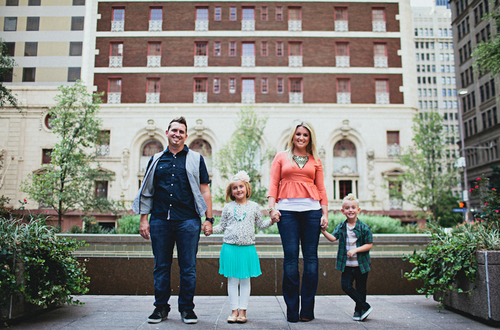It was a small thing that pushed Autumn Miles to divorce her first husband after six years of abuse: She commented on the basketball game they were watching together on TV, and he grabbed her elbow and squeezed it as hard as he could as punishment. That pinch woke her up and made her ask, "Why did he just do that, and why am I still with this person?"
To the rest of the world, Miles' husband was a good, church-going Christian man. "But," Miles says, "behind closed doors he would abuse the word 'submit' and tell me, 'if you follow the Bible you have to obey me.'" He was physically, sexually, and emotionally abusing her, and using a Biblical teaching to justify his actions.
Miles grew up in small-town Indiana, the daughter of a conservative Baptist pastor. Like many of her peers in her community, she had married young. Her family stood by her as she was disciplined by her church for divorcing. In fact, her father was eventually fired.
More from The Stir: 'Full House' Star Candace Cameron Plays Submissive Wife to Stay Married
The Evangelical community believes that God commands wives to be submissive to their husbands. "Wives, submit yourselves to your own husbands as you do to the Lord," reads Ephesians 5:22. In its purest practice, submitting is a choice a woman makes out of devotion to God, and out of respect for her husband — who is leading his family through love. The husband and wife may operate much like an egalitarian couple, day-to-day. But ultimately both know it is the husband who is leading and has stewardship over his family.
In some cases, this commandment for wives to submit to their husbands gets distorted by men. They rule without leading and without love. They act as if submission is compulsory for women.
Despite this, Miles agreed to "submit" to a husband again, even after leaving a marriage where the practice was used abusively.
She definitely did NOT want to repeat her abusive relationship — that much she knew. So as a newly-single woman, Miles enrolled in college. Meanwhile, she had gone from just a church-goer to a true believer. Through the cricible of her marriage she forged a stronger relationship with God. She also felt a stronger commitment to following God's word as expressed in the Bible — he had saved her life, she felt, and she would do anything to follow him. Even submit to a husband again someday.
At first she didn't want to get married at all, let alone repeat the same kind of submissive wife role. "I struggled with that," she says. "I had to work through this myself, and the key was God." She started praying, "If you want me to get married again, you have to protect me. You have to bring someone into my life who is trustworthy."
How does ANY woman really know when she's met someone trustworthy? To hear Miles describe how she met her second husband, Eddie, it actually doesn't sound that mysterious. She was introduced on a Christian college campus, between classes, by her brother.
"There was something different about him," Miles says. "He was not harsh. He was very kind, but a leader at the same time. He was very interested in my heart, and not just in the way I looked." She picked up on an inner strength he had, a unique combination of respect, compassion, confidence, generosity, and openness.
Whether you want to call it divine inspiration or intuition or being a good scientist, the truth is women often know who we're dealing with when we meet certain men. Miles admits, in hindsight, that she knew her first husband was wrong for her. She knew it on her wedding day. And she also knew that her second huband was special.
Having survived an abusive relationship, Miles' dream was to help other women in crisis. She shared this aspiration with this new young man, and he told her he loved that idea. "He affirmed everything I was talking about, and told me, 'you can do that. That sounds incredible.'" And then he shared his own goals, dreams, and aspirations. (Miles' husband works with teenagers.)
He was showing Miles his leadership style, what Miles calls a kind of "servant leadership," which is about enabling people to do their best — coaching rather than bossing around. And it made Miles want to follow him.
So what does that mean?

As newlyweds, Miles' husband put up their boat for sale. Her intuition told her it wasn't a good idea. "I don't know why. I just had a premonition." She shared that with her husband, and then she respected his decision to sell the boat anyway. A year later, the buyer still had not made a single payment on the boat.
It was a pivotal point in their marriage. Miles' husband wished he'd listened to her. "It showed him, 'my wife has a good opinion and I've got to listen to her premonitions.' So now, we come together before we make a decision."
"I'm the CEO of a women's organization, an author," Miles adds. "I have a brain and an opinion — a strong opinion." She is the founder and president of The Blush Network, a conference ministry focused on women, a radio co-host, and the author of the book, Appointed. Her marriage sounds a lot like an egalitarian one, but the difference is how they regard each other.
The word "submit" is a translation of the Greek word "hupotasso," Miles says, which means "to place under willingly." "Jesus and God were equal," Miles explains, "but Jesus willingly submitted to God's leadership. He placed himself under God." In the same way, she chooses to place herself under her husband's leadership — not because her husband commands it, but because God commands it.
It's the same way mother of three grown children Freda Emmons describes her marriage of 37 years. Like Miles, Emmons is a survivor of physical and sexual abuse — she describes how she healed from her turbulent childhood and youth in her memoir, Flame of Healing.
"As a young lady, I was extremely confused about relationships, boundaries, and life in general" Emmons says. "I could have wound up with a man who damaged my fragile emotions even more, or worse, one who would beat me senseless."
Instead, a month after praying for someone to love who would love her, Emmons met her husband, a man she says taught her to live in peace.
"It's actually been a lifetime of learning to trust God, that He will care for me, even when my husband makes mistakes, which sometimes happens, and when I disagree with him," Emmons says. "Even more than I trust my husband," Miles says, "I trust God."
Following a husband's leadership is a conscious choice that both Emmons and Miles say takes discipline. Miles says, "There is strength in saying, 'I am choosing to do this' rather than saying, 'I'm weak so I'm doing this.'"
It's interesting that for both women, being a "submissive" wife is in some ways … empowering. It's the exact opposite of what you'd think. I don't know that it's for everyone, and I do think you really have to find the right man to make it work. But then, isn't that always the case? Whatever the power dynamic in your marriage, the important thing is that you both agree on what it should be, and that you both operate out of love and cooperation.
Did these women change your perception of what it means to be a submissive wife? Are there similarities between your marriage and theirs?
Image prudkov/ Shutterstock, Autumn Miles




